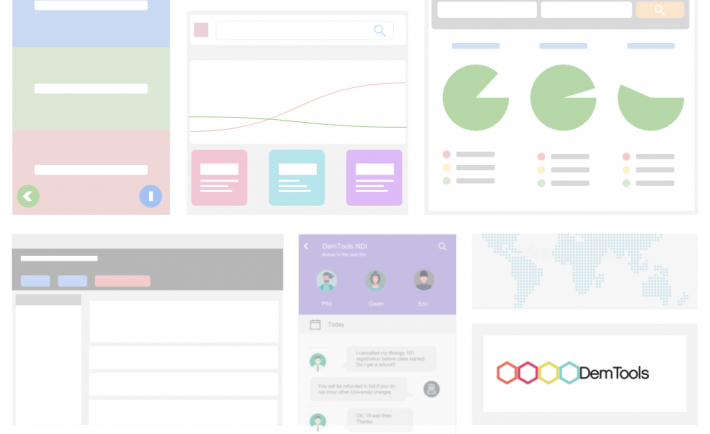It is hard to overstate the impact of digital transformation on democracies and the daily lives of citizens around the world. The developing world is coming online at an extraordinary pace; there are places in which NDI works that are receiving the most significant innovation of the 20th century – electrification – at the same time as that of the 21st – instant global communications. Past technology revolutions such as the printing press or broadcast media have transformed democracy and politics in rapid, profound, and hard to anticipate ways.
The State of Democracy and Technology
In An Election Year, Africa’s Largest Democracy Confronts Disinformation Head On
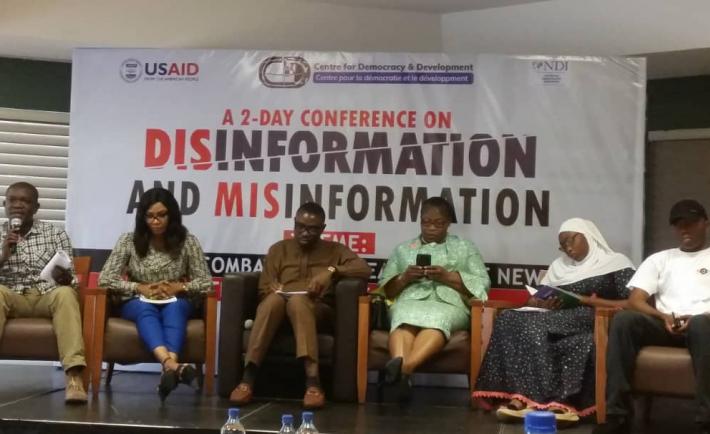
The findings of the "Sorting Fact From Fiction" report were presented at the two-day “Conference on Combating Disinformation and Misinformation” in Abuja
In February 2019, Nigeria went to the polls to elect its President, Vice President, House of Representatives and the Senate facing an exponentially growing volume of news and online information about the election and various campaigns, particularly of President Muhammadu Buhari and his challenger, Atiku Abubakar. Supported by USAID’s Electoral Empowerment for Civil Society Program, NDI worked with local partners in Nigeria at the Center for Democracy and Development to outline what happened online during the election and identify solution driven responses through fact checking, media literacy and research into the online environment.
On the Ground, Breaking New Ground: NDI and IWPR Fight Fake News in Malawi
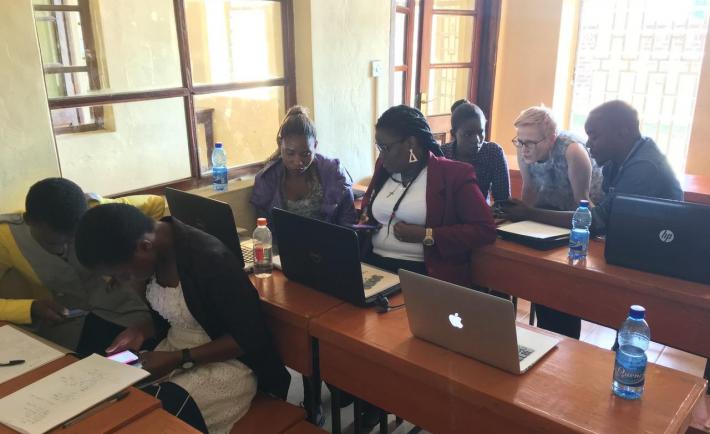
Malawian journalists at the Malawi Institute of Journalism combating disinformation during the Malawi elections.
The 2019 Presidential elections in Malawi were anticipated to be the closest elections in history for the country, and therefore, there was heightened interest, especially internationally. When an image of Tweet claiming to be from the President of the United States expressing his political preference for a particular Malawian presidential candidate was circulating, I knew the information environment was rapidly changing in Malawi. It was deep into campaign season in the southeastern African country of Malawi and a disturbing new trend emerged: digital disinformation. The constant, relentless false news stories were being spread via social media and across platforms like WhatsApp at an alarming rate. Though false news stories meant to deceive the electorate can be common around elections, especially around the electoral process and candidates, the excessive rate at which it was spreading in Malawi caught us all by surprise.
How are journalists fighting back against authoritarianism in the Philippines?
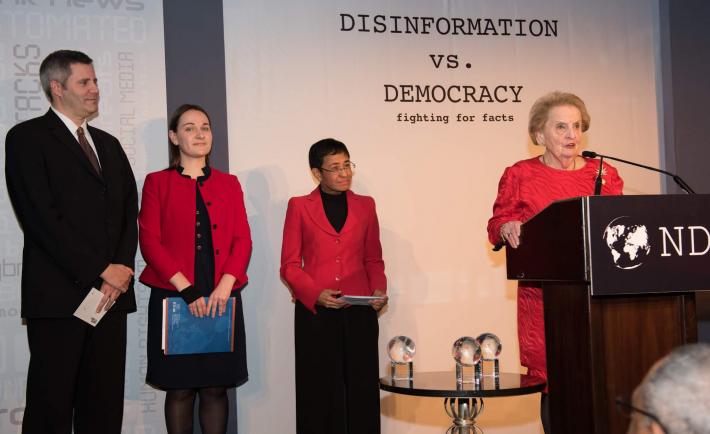
NDI 2017 Democracy Award recipients with (right to left) Secretary Madeleine Albright, Maria Ressa (Rappler), Margo Gontar (StopFake.org), Dr. Phil Howard (Oxford Internet Institute). Photo credit: Margot Schulman
Celebrating “women risk takers,” this video focuses on #DemocracyHero Maria Ressa, a veteran journalist and the CEO of Rappler, the leading independent online news network in the Philippines that has been at the forefront of combating disinformation and exposing human rights abuses under the administration of Philippine President Rodrigo Duterte. For their critical reporting, Maria and her fellow independent journalists have been indicted multiple times on questionable charges. Maria herself has been arrested twice. Maria’s courage has been globally recognized. Among many accolades, she is a recipient of NDI’s Democracy Award in 2017, and TIME magazine’s Person of the Year award in 2018.
How building data protection regimes can counter disinformation
Online disinformation and computational propaganda can have major effects, particularly in volatile political environments where public opinion can be shifted to a narrative pushed by a group with access to personal data from target populations. The power of online systems to shift elections or referenda is the lesson of many recent political campaigns in history. That reality has shown the importance of strong institutions, laws that are capable of shifting with ongoing technological and political innovation, and better corporate governance.
Game Changer: Human-Centered Design for Democracy

DemGames for Debates was developed in partnership with NDI’s Citizen Participation, and Latin America and Caribbean teams.
As the Technology Innovation team at NDI, we are always looking for new approaches to build intuitive platforms that make an impact for our partners in their particular context. One of our recent pilot projects – DemGames – offers partner organizations an opportunity to engage youth on civic and voter education issues through an interactive learning platform. Last April, as we began to think of the many ways a gaming platform could contribute to a youth debates program in Guatemala, we decided to run a three-day design sprint, adapting a human-centered design approach, to develop a prototype we could begin to test. Here are some of the lessons we have learned.
Cybersecurity in Ukraine: Deep Dives vs Broad Brush
The internet has never felt like a scarier place. Whether from sophisticated nation-state actors or freelancing hackers, democracy and human rights organizations face dangerous threats online. Despite the risks, civic and political players must be active in the digital arena with their country’s citizens to have an impact. NDI is working to help these organizations engage online and stay safe. Ukraine is in a dangerous digital neighborhood so political parties, civil society organizations and elected officials have a heightened need for cybersecurity.
Sorting Truth from Truthiness in the Digital Age
“Who you gonna believe” – as the comics say – “me, or your lyin’ eyes?” When it comes to politics, cognitive bias has always given citizens a strong push to believe “their side,” whatever the evidence to the contrary suggests. As disinformation swamps the internet, the problem has become much worse with lyin’ evidence that’s all too easy to believe. Increasingly, information is forged or manipulated. Convincing but fake, this disinformation fuels hyper-partisan hatred, bolsters conspiracy theories and undermines critical democratic institutions. But identifying disinformation is only one piece of the puzzle. What we need is a way to stop forged information entirely; a way to prove that content is original and legitimate.
A Force Multiplier for Democracy in the Digital Age
In countries and communities around the world, defenders of democracy are working to understand and respond to the ways that technology is impacting political and electoral processes. With every election or political event, democracy’s defenders are capturing new lessons on how democracy can weather evolving threats and even thrive in the digital age. Despite this growing body of projects and the commitment of local actors in countries around the world, responses to evolving digital challenges to date often lack coordination. But both globally and regionally, key democracy stakeholders haven’t had a proper channel for information-sharing, research coordination, and advancing shared priorities at the intersection of tech and democracy. So we’re building one, as a community.
Citizen Centered: Designing technology solutions for democracy at NDI
It’s amazing what humanity can do with the right tools. If you’ve ever looked up the work of Marshall McLuhan, he talks about how even the basic things we create change our outlook on life, politics and society. He’s also often attributed to having said, "We shape our tools and, thereafter our tools shape us…". The light bulb, for example, changed what time of day we can commune with each other.
I have been developing and designing software for close to twenty years. Since joining NDI, I’ve been thinking about the tools we build and how those tools, in turn, shape the lives of beneficiaries around the world. Human-centered design is the process of designing technology with and around the humans who use it. This process is analogous to building a bridge to connect two worlds. Just like civil engineers, practitioners of human-centered design at NDI must connect technology to the needs of citizens.

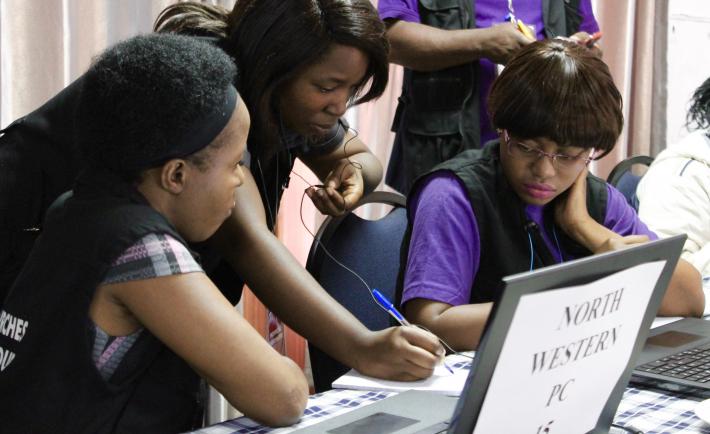
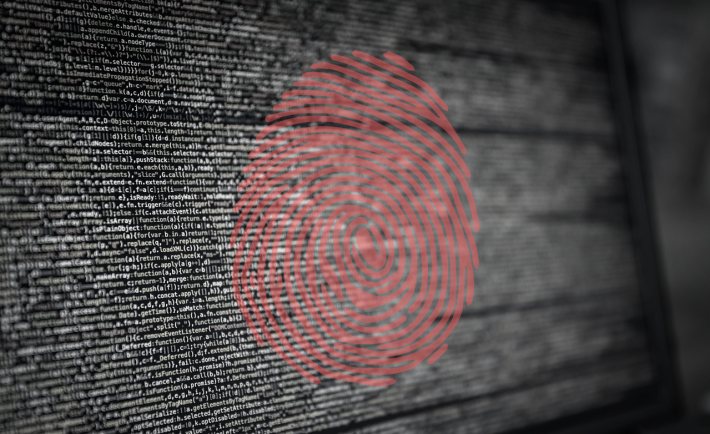
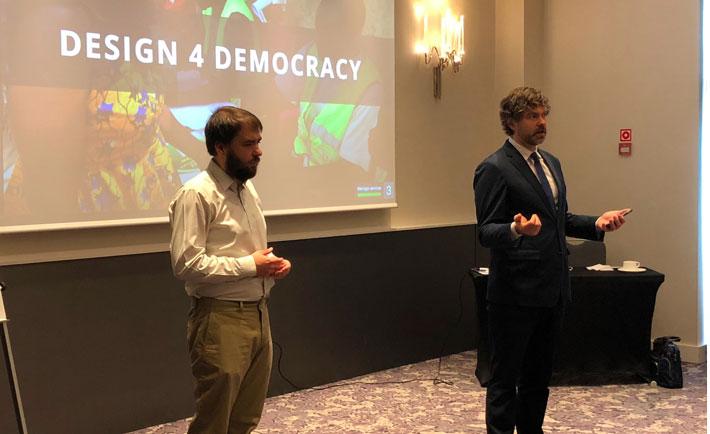
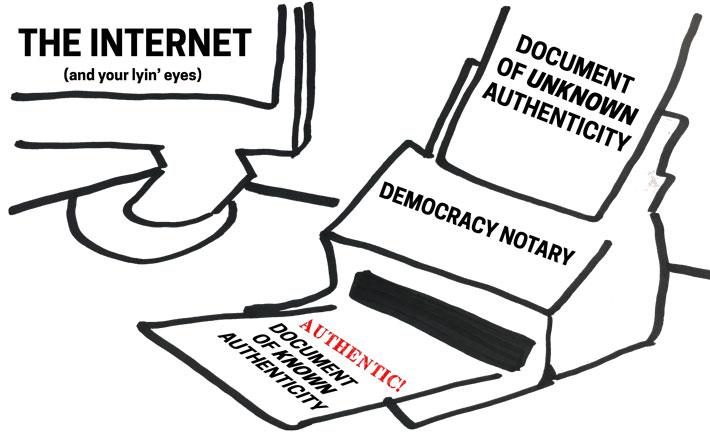
_1_0.jpg)
